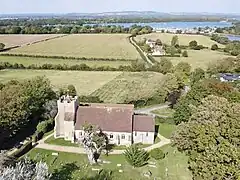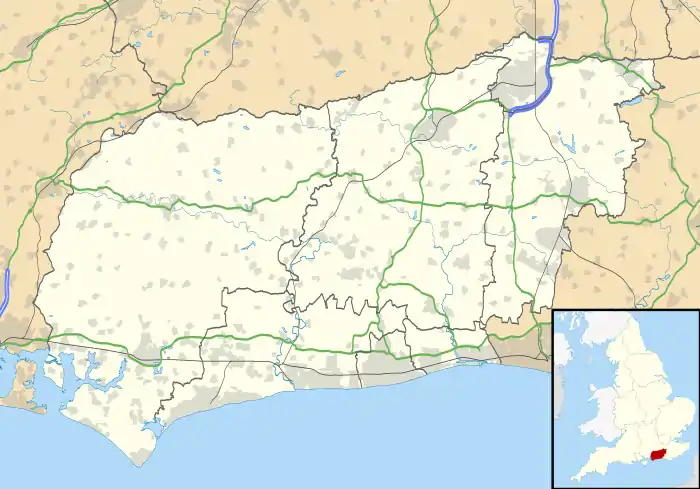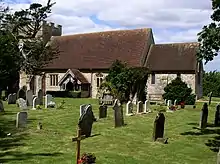Birdham
Birdham is a village and civil parish in the Chichester District of West Sussex, England. It is located on the Manhood Peninsula, c. 5 miles (8.0 km) south-west of the city of Chichester. The parish church is dedicated to St James, although the dedication was to St. Leonard until c. 1900.
| Birdham | |
|---|---|
 Birdham church with Birdham Pool behind | |
 Birdham Location within West Sussex | |
| Area | 6.96 km2 (2.69 sq mi) [1] |
| Population | 1,483. 2011 Census[2] |
| • Density | 202/km2 (520/sq mi) |
| OS grid reference | SU824003 |
| • London | 58 miles (93 km) NNE |
| Civil parish |
|
| District | |
| Shire county | |
| Region | |
| Country | England |
| Sovereign state | United Kingdom |
| Post town | CHICHESTER |
| Postcode district | PO20 |
| Dialling code | 01243 |
| Police | Sussex |
| Fire | West Sussex |
| Ambulance | South East Coast |
| UK Parliament | |
| Website | http://www.birdham.org.uk/ |
The village sits on the shores of Chichester Harbour and is home to a locked marina on the site of a former tide millpond. The tide mill building itself still exists.[3] In between it and Chichester marina are the lock gates to the disused Chichester Canal opened in 1822. The local school is Birdham C of E Primary School. According to the 2011 census Birdham parish had a population of 1,483.[2]
HMS Birdham, a minesweeper, launched on 19 September 1955, was named after the village.
History
Birdham's name derives from the Old English bridd and hām, and means a settlement frequented by young birds.[4][5]
The only evidence of prehistoric settlement is a Bronze Age settlement.[6]
Birdham is first mentioned in a series of Anglo-Saxon charters relating to land grants to the See of Selsey. Unfortunately, most of these are forgeries,[7][8] Birdham was located in the ancient hundred of Wittering[9] in Sussex according to the Domesday Book of 1086. The settlement comprised 16 households valued at three pounds five shillings.[10]
Birdham is an area of dispersed settlements with no defined centre with a single store and no pubs. The enclosure of Manhood Common led to the development of small farms but the rapid rise in population only began in the 1930s.
During World War II, the tide mill and associated boat yards became HMS Sea Serpent in 1942. The various holiday camps in the area were used as billets for troops training for amphibious landings, especially D Day.[11]
In May 2019, a new community centre opened.[12]
Governance
Birdham is governed at the parish level by Birdham Parish Council.[13]
Birdham is a part of the Chichester District,[14] and as such is governed by Chichester District Council.
Birdham is governed at the county level by West Sussex County Council.
For representation in Parliament, Birdham is a part of the Chichester constituency. Since 8 June 2017, the Member of Parliament for the Chichester constituency is Gillian Keegan.[15]
Geography
Demography
The 2011 census recorded a population of 1,483 for the parish of Birdham, forming 645 households. Birdham is a majority Christian parish with 981 (66.1%) residents identifying as such. 1,463 residents (98.7%) listed their ethnic group as White. The median age of Birdham parish was 50.[2]
Landmarks

The parish church, St James' Church, is a Grade I listed building.[16]
Transport
The nearest railway station is some 3 miles (4.8 km) northeast of the village, at Chichester or Fishbourne.
References
- "2001 Census: West Sussex – Population by Parish" (PDF). West Sussex County Council. Archived from the original (PDF) on 8 June 2011. Retrieved 12 April 2009.
- Birdham Parish: Local Area Report (Report). Office for National Statistics. 2011. Archived from the original on 27 May 2021. Retrieved 27 May 2021.
- "Post medieval and Industrial – AD 1485-1899" (PDF). Chichester Harbour Conservancy. Archived from the original (PDF) on 11 February 2015. Retrieved 11 February 2015. Retrieved 11 February 2015
- Mills, A. D. (2011). "Birdham". A Dictionary of British Place Names. Oxford University Press. ISBN 9780199609086. Archived from the original on 26 May 2021. Retrieved 26 May 2021.
- Glover, Judith (1974). The Place Names of Sussex. London, England: B. T. Batsford. p. 30. ISBN 9780713428537.
- The Birdham assemblage: further finds of Middle and Late Bronze Age pottery from the Sussex Coastal Plain Archived 24 September 2015 at the Wayback Machine Retrieved 10 February 2015
- "British History Online". Archived from the original on 8 January 2015. Retrieved 10 February 2015.
- L Fleming. History of Pagham in Sussex illustrating the administration of an archepiscopal hundred, the decay of manorial organisation and the rise of a seaside resort, 1950.
- "Open Domesday: Hundred of Wittering". Retrieved 29 June 2023.
- "Open Domesday: Birdham". Retrieved 29 June 2023.
- Ainsworth-Davis, John; de Creighton, Ami (2015). The Mountbatten Report. Goldeneye Publishing. p. 242. ISBN 978-1-312-74996-2.
- "Ceremony officially opens Birdham community centre". Chichester Post. 17 May 2019. Archived from the original on 26 May 2021. Retrieved 26 May 2021.
- "Birdham: Chichester District Council". Chichester District Council. Archived from the original on 20 April 2017. Retrieved 27 May 2021.
- "Chichester". Ordnance Survey. Archived from the original on 24 March 2019. Retrieved 27 May 2021.
- "New MP for Chichester". Chichester Post. 9 June 2017. Archived from the original on 27 May 2021. Retrieved 27 May 2021.
- "The Parish Church of St. James". National Heritage List for England. Historic England. Archived from the original on 12 September 2017. Retrieved 26 May 2021.
External links
![]() Media related to Birdham at Wikimedia Commons
Media related to Birdham at Wikimedia Commons